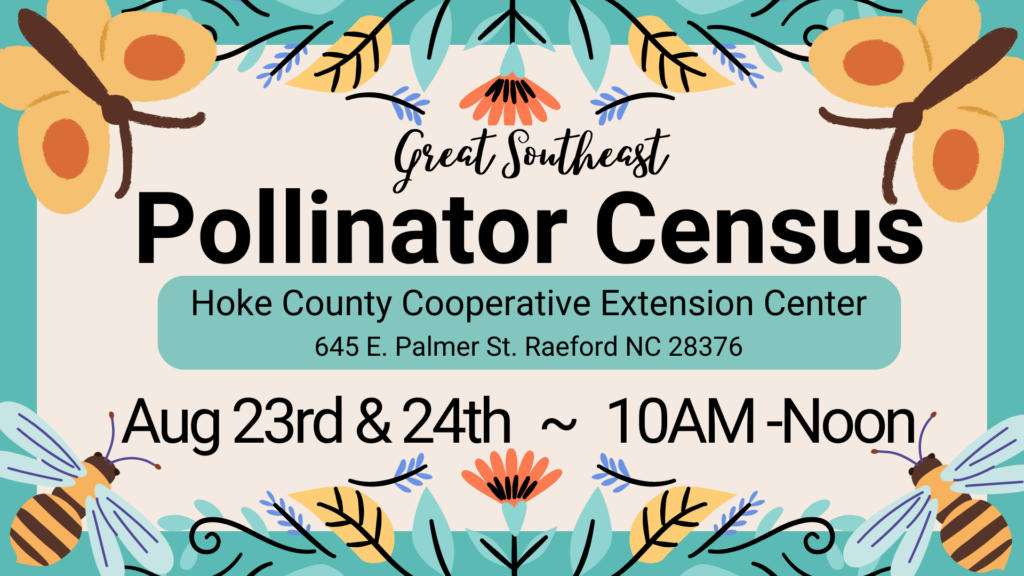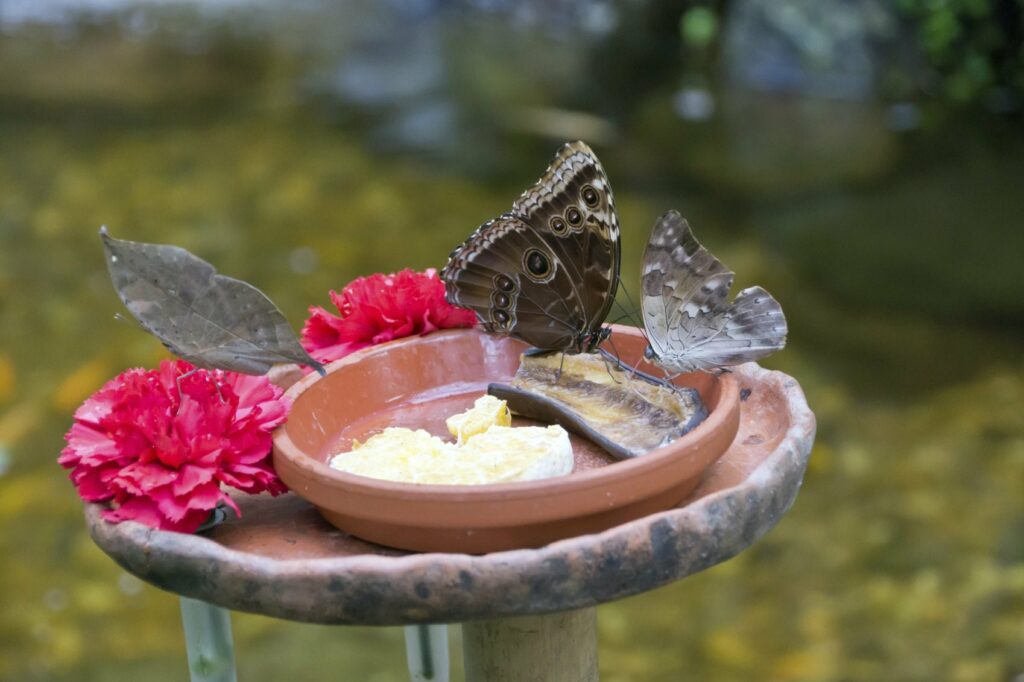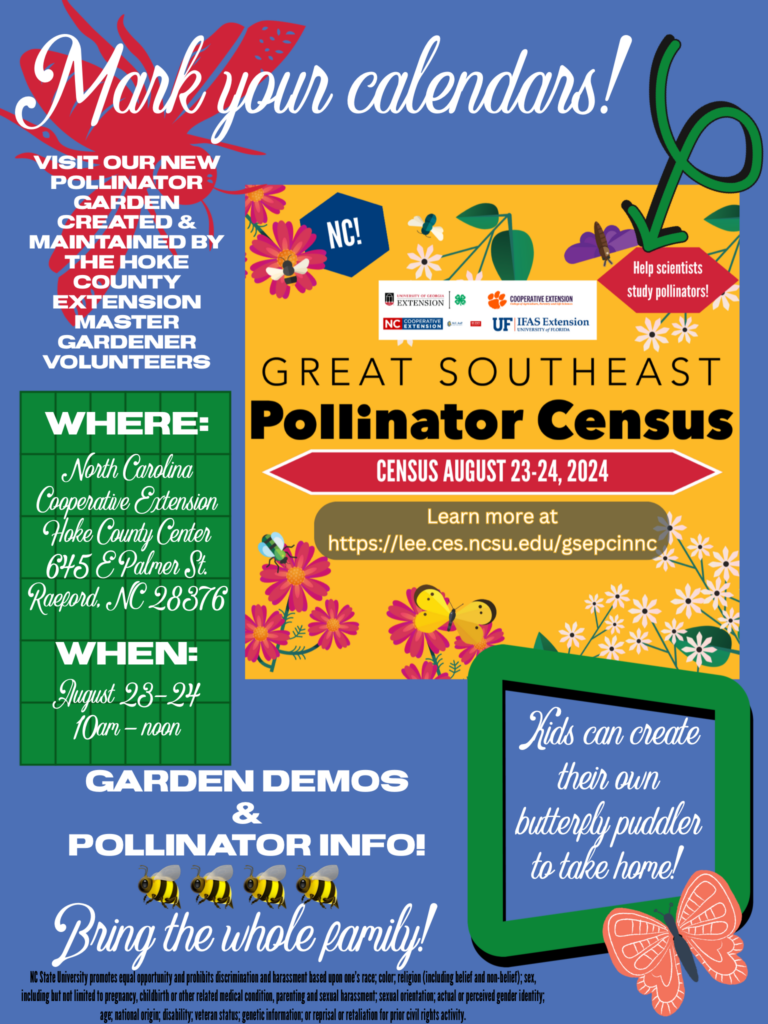Great Southeastern Pollinator Census 2024
go.ncsu.edu/readext?1010612
en Español / em Português
El inglés es el idioma de control de esta página. En la medida en que haya algún conflicto entre la traducción al inglés y la traducción, el inglés prevalece.
Al hacer clic en el enlace de traducción se activa un servicio de traducción gratuito para convertir la página al español. Al igual que con cualquier traducción por Internet, la conversión no es sensible al contexto y puede que no traduzca el texto en su significado original. NC State Extension no garantiza la exactitud del texto traducido. Por favor, tenga en cuenta que algunas aplicaciones y/o servicios pueden no funcionar como se espera cuando se traducen.
Português
Inglês é o idioma de controle desta página. Na medida que haja algum conflito entre o texto original em Inglês e a tradução, o Inglês prevalece.
Ao clicar no link de tradução, um serviço gratuito de tradução será ativado para converter a página para o Português. Como em qualquer tradução pela internet, a conversão não é sensivel ao contexto e pode não ocorrer a tradução para o significado orginal. O serviço de Extensão da Carolina do Norte (NC State Extension) não garante a exatidão do texto traduzido. Por favor, observe que algumas funções ou serviços podem não funcionar como esperado após a tradução.
English
English is the controlling language of this page. To the extent there is any conflict between the English text and the translation, English controls.
Clicking on the translation link activates a free translation service to convert the page to Spanish. As with any Internet translation, the conversion is not context-sensitive and may not translate the text to its original meaning. NC State Extension does not guarantee the accuracy of the translated text. Please note that some applications and/or services may not function as expected when translated.
Collapse ▲The Great Southeast Pollinator Census is a wonderful opportunity to get outside, observe nature, and help contribute to valuable scientific research too! This research plays an important role in protecting our food supply!
On August 23rd and 24th we will be joining a multi-state effort to encourage residents to help protect the region’s vital pollinator population by helping to identify and count the pollinators present near where you live.
Scientists need help understanding the types and quantities of pollinators and where they are located.
The Extension Master Gardener volunteers in Hoke County are holding a pollinator count and educational events at their Pollinator Garden located at the Hoke County Extension Center (645 E. Palmer St, Raeford NC 28376). This is a family event that will include garden demos, pollinator information and an opportunity for kids to make and take their very own butterfly puddler!
The count is part of the Great Southeast Pollinator Census, created by University of Georgia Extension specialist Becky Griffin in 2019. South Carolina joined in 2022, and North Carolina joined in 2023.
This is important because of the function pollinators play in food production.
“Many of our fruits and vegetables have to be pollinated by insects,” said Charlotte Glen, the NC State Extension Master GardenerSM program manager. “To reproduce, they need an insect pollinator to help them out. But many of our pollinator populations are declining. A lot of it is because of foraging and nesting habitat loss. Areas that used to have a lot of natural flowering plants that provide nectar resources aren’t there as much.”
Many people are familiar with a worrying decline in pollinators, particularly bees. The census provides a way to do something about it.
How to Get Involved
- Visit the Great Southeast Pollinator Census website for in depth information on how to participate and to download counting sheets and insect identification guides.
- Identify a plant that attracts pollinators, and get ready to count on Aug. 23 and/or 24.
- Join us at the Hoke County Center in Raeford, NC on Aug 23rd and 24th Come learn about the different types of pollinators and why they are important!
Citizen science is exciting!
You can make a difference for pollinator conservation just by joining the count!
Related: Growing a Pollinator Garden
Related: The Extension Gardener Plant Toolbox helps gardeners find the best plants to attract pollinators






